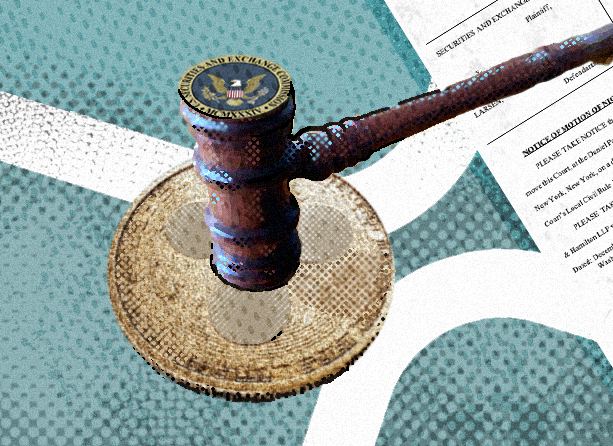Ripple vs SEC Updates
The ongoing dispute between Ripple and SEC is closely followed by crypto participants and investors alike, with many anticipating the outcome's potential impact on the market.
The ongoing dispute between Ripple and SEC is closely followed by crypto participants and investors alike, with many anticipating the outcome's potential impact on the market.

The legal battle between Ripple and the SEC continues to unfold with new developments and criticisms of the regulator's stance on the matter. Ripple has continued to defend its position, arguing that XRP is not a security and that the SEC has overstepped its regulatory authority. Meanwhile, the SEC has maintained that XRP is a security and that Ripple violated securities laws by selling it to investors.
Stuart Alderoty, chief legal officer (CLO) at Ripple, in a recent interview with Blockworks' Casey Wagner, has critically assessed the US regulatory environment:
“The first advice you give, the first piece of advice you give somebody who’s thinking about a project, is don’t launch it in the US because the rules are unclear. Go to a jurisdiction where the rules are clear, not light-touch, but clear.”
Previously, Stuart Alderoty said the company could appeal to the Supreme Court if the outcome of the case does not favor them. He added that historical outcomes suggested the SEC had a low chance of winning at the Supreme Court. Alderoty pointed out that the SEC had lost four out of its last five cases in the Supreme Court, attributing these results to individuals who had the courage and means to resist the SEC's "bullying" tactics and the use of "stretch legal positions" that were not consistent with the law. Meanwhile, Ripple CEO Brad Garlinghouse indicated in October that the lawsuit would end in the first half of 2023 and that he would be open to a settlement, as long as XRP is not classified as a security.
On February 19, legal expert John Deaton tweeted that the SEC's argument is "stupidly outrageous". Specifically, Deaton criticized the SEC's assertion that anyone who acquires XRP in Japan is part of a common enterprise with Ripple and all other XRP holders, thereby making the token a security. This claim contradicts Japan's Financial Services Agency, which has previously stated that XRP is not a security.
In another tweet from February 27, Deaton also challenged a statement made by SEC Chair Gary Gensler, who claims that all cryptocurrencies, except for Bitcoin, are classified as securities. Deaton said there is no consensus on how to classify securities in the cryptocurrency industry, referencing MicroStrategy's Executive Chairman, Michael Saylor's statement that Gensler's comments indicated a growing consensus on the matter.
Deaton has also proposed settlement options for Ripple and the SEC ahead of the summary judgment. If the regulator recognizes ongoing and future sales of XRP as non-securities, Deaton suggests that Ripple could pay a settlement ranging from $100 to 250 million. However, Deaton warned that the SEC might not be receptive to this proposal, considering their intensified scrutiny of the digital assets.
Forbes journalist Roslyn Layton's motion to access the 2018 Hinman speech documents sparked a renewed interest in the case. Ripple's legal team has been trying to access the documents for months, which relate to a speech given by ex-SEC Division Director William Hinman in June 2018, where he allegedly said that Ethereum's ETH is not a security. Ripple believes that the same principle could be applied to XRP. Initially, District Court Judge Sarah Netburn had ruled that the email and drafts of the speech were not protected by the deliberative process privilege. In the latest decision, however, US District Court Judge Analisa Torres upheld Judge Netburn's ruling and rejected the SEC's objection to releasing the documents.
The motion has received support from U.S. government watchdog Empower Oversight, and with SEC Chair Gensler stating that only Bitcoin is not a security, the unsealing of the document could be crucial to the case.
Following the submission of new amicus briefs and proposed dates by the SEC, XRP experienced another surge in value. It peaked at $0.507 on November 5, but plummeted after the LBRY news, eventually dropping to $0.32 on November 9. In the same month, XRP saw some minor gains after rumors circulated that a settlement had been reached between Ripple and the SEC, but these claims were later dismissed by a Ripple spokesperson. As of December 13, the cryptocurrency's trading value was $0.391, indicating a 3.84% increase in the previous 24 hours. However, it hit a low of $0.334 on December 19 before recovering slightly to reach a high of $0.372 on December 27. The year ended with XRP closing at $0.3399. In January, XRP experienced some growth, closing the month at $0.4064, but it dropped slightly to around $0.3975 on February 7 and has been decreasing steadily.
Another ongoing legal dispute involving Ripple has seen a new development, according to defense lawyer James Filan. Since 2018, Ripple has been facing a class-action lawsuit in California where XRP investors allege that the company and its CEO, Brad Garlinghouse, sold XRP as an unregistered security, causing them to suffer losses. The plaintiffs are seeking damages and have asked the court to declare XRP as a security.
The case went through several procedural motions, including Ripple's attempt to dismiss the case. However, in March 2021, the judge denied Ripple's motion to dismiss, allowing the case to proceed to trial.
The crypto industry has closely monitored the Ripple-SEC legal disputes, which sees it as a potential benchmark for regulatory oversight of the space. The case has underscored the necessity for unambiguous and dependable regulatory guidelines for cryptocurrencies and the limitations of the SEC's regulatory authority. The crypto sector will be closely observing the outcome of the case to see how it might affect future regulatory actions. What is clear - the recent criticism of the SEC's cryptocurrency regulatory approach highlights the difficulty and disagreement surrounding the issue.